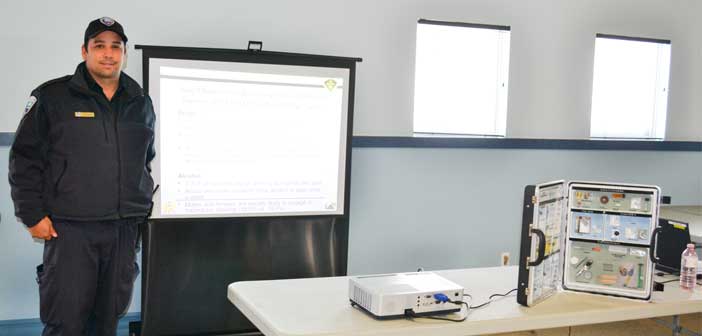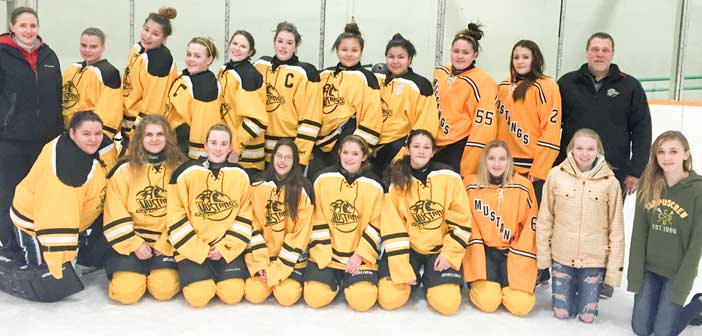AUNDECK OMNI KANING—Beverly has a lot of impressive nursing credentials to her name, but when she travels to Island communities talk about Al-Anon “I drop all of my titles,” she said. Among those dropped titles is Beverly’s last name. “I am only Beverly,” she continues. Al-Anon, a support group for the families of those suffering from the disease of alcoholism, takes the ‘anonymous’ part of its name very seriously.
Beverly came to speak on Al-Anon as park of a series of events being held in First Nations communities across Manitoulin for National Addictions Week. She delivered her talk before a packed room at the Naandwehgiigamik Health Centre (place of healing) in Aundeck Omni Kaning.
“I didn’t know what to expect,” said Beverly about the number of people in attendance. “As I told Holly (Anderson, Aundeck Omni Kaning NNADAP assistant, who hosted the event and who prepared the luncheon), “if one person shows up that will be fine, because one person is like a seed. From one person can grow a whole group.”
Accompanying Beverly, who is an Al-Anon member in her own right of some 30-plus years, was Wilma, who has also been a member for 38 years.
There is often a lot of confusion about Al-Anon and how it works and Beverly was in AOK to help clear up some of that confusion by explaining Al-Anon and who can benefit from joining a group.
“Al-Anon is for the family members,” said Beverly, explaining that the organization provides support and strategies for family members of an alcoholic in dealing with the disease. “When I came into Al-Anon I learned that I had to focus on myself, not on the alcoholic. If I am always ranting, swearing (Beverly does not strike one as a person for whom swearing is a first language) and nagging, think how you would feel. How would you react?” The natural tendency for many people is to push back and become defensive and/or aggressive.
Beverly and Wilma had a sheaf of pamphlets, brochures and magazines from Al-Anon on hand covering a wide range of issues and questions often facing the family members of an alcoholic.
One of the key lists presented posed the question, ‘is Al-Anon for you?’ and consisted of 20 key questions. Those questions included: do you have money problems because of someone else’s drinking?; do you tell lies to cover up for someone else’s drinking?; do you feel that if the drinker cared about you, he or she would stop drinking to please you; do you blame the drinker’s behaviour on his or her companions?; are plans frequently upset or cancelled or meals delayed because of the drinker?; do you make threats, such as, “if you don’t stop drinking, I’ll leave you”?; do you secretly try to smell the drinker’s breath?; are you afraid to upset someone for fear it will set off a drinking bout?; have you been hurt or embarrassed by a drinker’s behaviour?; are holidays and gatherings spoiled because of drinking?; have you considered calling the police for help in fear of abuse?; do you search for hidden alcohol?; do you ever ride in a car with a driver who has been drinking?; have you refused social invitations out of fear or anxiety?; do you feel like a failure because you can’t control the drinking?; do you think that if the drinker stopped drinking, your other problems would be solved?; do you ever threaten to hurt yourself to scare the drinker?; do you feel angry, confused, or depressed most of the time?; and do you feel there is no one who understands your problems? Answering yes to three or more of these questions, Al-Anon (or Alateen for teens) may be able to help you.
There are a series of these surveys that can help guide people to seek out the organization’s support and they could be found on the Al-Anon pamphlets or online at the organization’s website: alanon.org.
Beverly spoke to the group gathered at AOK from her heart because she herself is a member of the group. She spoke of attempting to murder her husband to free herself from his addiction, growing up with her alcoholic mother and the heart-wrenching interactions she had visiting with her son in prison.
Beverly described how she opened the windows of the bedroom where her husband was passed out drunk during freezing weather, putting blankets along the door to keep the cold from the rest of the home. Her desperation left her with no other idea of how to escape. Thankfully, her plot failed and she discovered Al-Anon.
Al-Anon “helps us develop a whole different way of thinking,” she said. By recognizing alcoholism as a disease and “learning that living with the effects of someone else’s drinking is too devastating for most people to bear without help” members discover that “individuals are not responsible for another’s disease or recovery from it.” That detachment can be a very difficult path to follow, especially for parents, but it is key to saving yourself from the debilitating effects that can come through association with someone suffering from the disease of alcoholism.
“We let go of our obsession with another’s behaviour and begin to lead happier and more manageable lives,” said Beverly, “lives with dignity and rights; guided by a power greater than ourselves.” The focus on a greater power came up a lot in the discussion about Al-Anon, but detachment was also central to the concept.
“Detachment is neither kind nor unkind,” said Beverly. “It does not imply judgment or condemnation or the person or situation from which we are detaching. It is simply a means that allows us to separate ourselves from the adverse effects that another person’s alcoholism can have upon our lives. Detachment helps families look at their situations realistically and objectively, thereby making intelligent decisions possible.”
Although ‘a higher power’ plays a central role in Al-Anon, the worldwide organization is not “a religious organization or counselling agency,” cautioned Beverly. “It is not a treatment centre nor is it allied with any other organization offering such services. There are no dues and we do not accept outside donation.”
Membership is voluntary and the only requirement is that a member’s life has been adversely affected by someone else’s drinking problem.
More information about Al-Anon or to finding a local meeting can be accessed at al-anon.org, by telephone at 888-4AL-ANON (888-425-2666) or by mail at PO Box 862, Midtown Station, New York, New York, 10018-0862.





